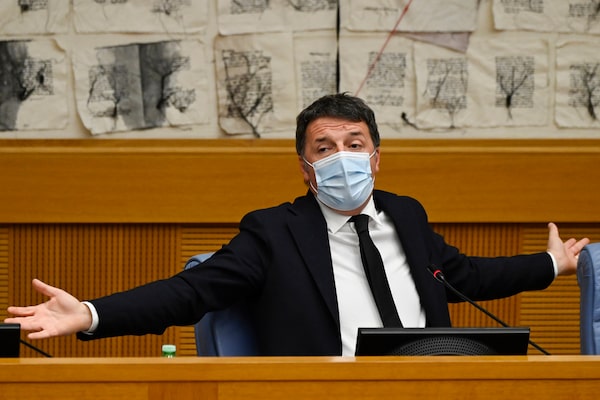
Matteo Renzi, head of the political party Italia Viva, holds a press conference at the Italian Chamber of Deputies in Rome, Wednesday, Jan. 13, 2021.Alberto Pizzoli/AFP/Getty Images
Italy added a political crisis to the pandemic crisis on Wednesday night, when former prime minister Matteo Renzi yanked his ministers from the fragile, and now possibly doomed, governing coalition.
Mr. Renzi, the leader of the small Italia Viva – Italy Alive – party, is pulling three ministers from Prime Minister Giuseppe Conte’s coalition, leaving Mr. Conte without a majority while he scrambles to find a way to keep his government going and prevent the Italian pandemic from getting worse.
On Wednesday, Italy’s COVID-19 death toll surpassed 80,000, the second-highest in Europe after Britain, and total cases reached 2.3 million.
Mr. Renzi’s sabotage effort did not come as a surprise. For weeks, he had been heaping criticism on Mr. Conte over his government’s handling of the pandemic and the severe damage it has inflicted on the European Union’s third-largest economy, where youth unemployment has reached almost 30 per cent. “The political crisis has not been started by Italia Viva; it has been going on for months,” Mr. Renzi said.
He was also critical of the government’s plans to spend the €200-billion ($308-billion) it will receive under the European Union’s new pandemic recovery fund, saying Mr. Conte’s government spares too little for health services and infrastructure projects.
Mr. Conte, a Florentine lawyer who has no political party machine behind him, emerged as the compromise candidate to form a government after the previous ruling coalition blew apart a year and a half ago. The current centre-left coalition is dominated by the Democratic Party, where Mr. Renzi was once leader, and includes the anti-establishment Five Star Movement.
Mr. Conte’s handling of the pandemic was initially popular among Italians, who appreciated his direct, apolitical style and clear messaging. But as the pandemic dragged on and put Italians in the worst-hit parts of the country back into lockdown in the late fall, his popularity has faded somewhat.
Political commentators were somewhat baffled by Mr. Renzi’s audacity, since his party attracts only 3 per cent of voters in opinion polls. But Francesco Galietti, chief executive of Policy Sonar, a Rome political risk consultancy, noted that Mr. Renzi struck when Mr. Conte was losing favour over his recovery fund spending plans, which did not go over well in Brussels and Berlin.
“He [Mr. Renzi] knows that Brussels, and even more so Berlin, are deeply disappointed with Conte’s performance on the EU recovery fund thus far,” Mr. Galietti said. “At the very least, all that money should be channelled toward investments and reforms, most certainly not cash-back schemes and pork barrelling.”
Mr. Conte’s plans were not immediately known. According to strategists at Dutch bank ING, his options include a cabinet reshuffle that would give Italia Viva ministers more clout in a new cabinet; a cabinet reshuffle under a new prime minister; a new coalition that would leave Mr. Conte as prime minister; a national unity government devoted to the Italian economic recovery; or an election.
An election seems highly unlikely, with Italy battling a pandemic and focused on accelerating its vaccination rollout, and there is no obvious candidate to replace Mr. Conte as prime minister.
Late on Wednesday, after Mr. Renzi was criticized by some coalition members for triggering a political crisis in a pandemic, he said he may be willing to back a new coalition led by Mr. Conte. He also said he would consider joining a technical government led by a non-partisan figure.
ING said it doubts the sudden political crisis will trigger financial problems for Italy, which has faced no obstacles selling debt during the pandemic, a scenario that the bank thinks will remain unchanged. In a note, ING said factors including “aggressive” European Central Bank purchases of Italian debt, low interest rates and fiscal transfers from the EU will continue to work in the Italian government’s favour.
Our Morning Update and Evening Update newsletters are written by Globe editors, giving you a concise summary of the day’s most important headlines. Sign up today.
 Eric Reguly
Eric Reguly